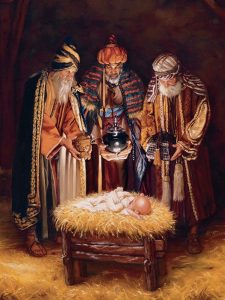
New Year, New Me!
Resolutions with grace!
As we begin a new year, we often hear the adage “New Year, New Me!” People make the usual New Year resolutions – they put away the selection boxes and chocolates, start “dry January”, hit the gym, start a new fitness class, or employ a personal trainer. Football teams start training again – players are evermore determined despite the tough sprints and the press ups on dark cold nights. January offers the possibility to become someone new, different, and better. Our resolutions may not be based on shedding the weight we piled on over Christmas or toning up in the gym. We may decide to work on ourselves, develop a new virtue, improve friendships, do a social media detox, or avoid toxic atmospheres. However, our Christian faith teaches us that we develop the “New Me”, not according to the DIY approach but through Christ: “So for anyone who is in Christ, there is a new creation: the old order is gone and a new being is there to see. It is all God’s work …” (1 Cor. 5: 17-18). The Christmas season, with the celebration of the birth of Christ, the Epiphany and the Baptism of the Lord, invites us to become that new creation.
What gift do I bring?
During the Christmas season, we celebrated the Solemnity of the Epiphany when the wise men from the East arrived at Bethlehem, having followed their celestial Sat Nav, the star. We hear: ‘They fell down and worshipped…and offered him gifts of gold, frankincense and myrrh” (Mt. 2:11-12). Each of these gifts offered to the Child Jesus symbolize the identity of this royal baby born to poor parents from Nazareth, Mary and Joseph.

What is precious to me?
The gold is a symbol of royalty, the gift given to a king. Jesus is the new King David come to save his people. At the Annunciation the Angel Gabriel promises Mary that her son, Jesus, will be “Son of the Most High” (Luke 1: 32) and will be given the “throne of his ancestor David”. Joseph is a descendent of King David and as the legal guardian of Jesus, he brings Jesus into the royal lineage of David. This gift of gold can be for us a symbol of what is precious to us – our time, our freedom, our wealth, our talents. In this New Year, what can we offer to Jesus as an act of surrender to God’s will and as an act of adoration to Jesus?
The Incense of Prayer
Incense is the gift symbolising worship offered to God. We offer Jesus the perfume which burned each evening on the altar in the temple in Jerusalem. St Josemaría Escrivá, the Spanish priest, identifies the incense as ‘our desire to live a noble life which gives off the ‘aroma of Christ” (2 Cor. 2:15) (Christ is Passing By, 36). A few questions come to mind: Does our prayer life and our living give off the ‘aroma of Christ’? How can we improve our prayer life? Perhaps we could do Fiat 90 or Exodus 90 to advance our spiritual lives? Maybe we could journey with Fr. Mike Schmitz on his Bible in a Year program?
The Ointment of Care
Myrrh is an anointment used to embalm a body for burial and symbolises human weakness and the need for care and affection. God, through the Incarnation, takes on human weakness and myrrh reminds us of the Passion of the Lord (St Josemaría, Christ is Passing By, 37). On the Cross he is offered wine mingled with myrrh (c.f. Mk. 15:23) and his body is anointed with myrrh at his burial (c.f. Jn. 19:39). Myrrh can be for us the offering of ourselves to Christ, sacrificing ourselves out of love for him. For Pope Francis, myrrh is the ‘balm for the bruised and wounded’, and in offering Christ our affection we ‘promise him that we will aid our marginalized and suffering neighbours…’. (Homily on the Solemnity of the Epiphany of the Lord, 6 January 2020). What do we need to sacrifice in order to unite our lives with the Crucified One? How do we bring healing and comfort to those who are marginalized and suffering? Perhaps we could volunteer at a homeless centre?
Integrity – Being True to Yourself
Advent 2021 has already started the Church’s liturgical year and during that season of preparation and waiting we heard from the ancient prophets of Israel who spoke of integrity or righteousness. Integrity means being true to oneself. Righteousness can have negative connotations with spiritual elitism, pride and external religousity. We heard from Isaiah: “so the Lord will make righteousness (tze·da·kah in Hebrew) and praise spring up before all nations” (Is. 61:11); “He shall judge with righteousness (tzedak in Hebrew) the poor” (Is. 11:4). In Jeremiah, we heard: “Look the days are coming, the Lord declares, when I shall raise an upright Branch for David” (Jer. 23:5). In these Old Testament, texts the word “tzedak” is translated as righteousness or integrity. The Messiah will come and restore righteousness and justice among the People of God, like a new King David. Righteousness or integrity is the quality of a person of faith. Integrity or righteousness in the context of the scriptures means being in right relationship with God, to be aligned to God’s will, and to be true to yourself, as a person created in his own image and likeness (Genesis 1: 26).
My True Self or Fantasy Self?
In December 2019, I was on a weekend retreat for Advent in a Benedictine monastery. As I was reading the readings for Advent which included Isaiah and Jeremiah I was drawn to the word “integrity” which jumped off the page at me. My reflection on this word integrity or righteousness led me to question my own integrity in life: Do I live out of that identity as a son of the Father? To use a phrase of the spiritual writer Thomas Merton, do I live out of a “false or fantasy self”? Am I true to myself as created in God’s image and likeness? Does my life reflect much pretense and an exaggerated emphasis on appearance and image? Do I live by Gospel values or do I act and aim to achieve simply to gain attention and popularity?
True Integrity in Christ
The birth of Jesus in Bethlehem signals the beginning of God’s search and rescue operation for humanity. God in Jesus Christ takes on human flesh and dwells among us (John 1:14). As the gifts of the wise men suggest, Jesus is a son of King David (Matthew 1:1) as he brings to the promise of a Messiah to its fulfilment and yet he is the Son of God and destined to suffer, be crucified, to die and rise again (c.f. Mark 8:31). Before Jesus begins his journey to Jerusalem, the place of crucifixion and resurrection, he is baptized in the River Jordan by John the Baptist. The Solemnity of the Baptism of the Lord concluded the Christmas season. This baptism was a ritual cleansing from sin. We may question: Why did Jesus have to be baptized when he was sinless as the Son of God? Jesus explains the significance of his baptism to John the Baptist: “It is fitting for us to fulfill all righteousness” (Matthew 3:15). Jesus wants to be baptized, according to Pope Benedict XVI, that he “blends into the gray mass of sinners waiting on the banks of the Jordan” (Jesus of Nazareth Part 1, p. 16).
Jesus wants to enter into messiness, the chaos, the hurt, and the wounds which are part of the experience of sinful humanity. Jesus’ act of descending into the waters of baptism and rising up from them is an anticipation of the Cross and Resurrection – Jesus descended into the tomb, into the experience of death only to be raised up in the Resurrection. Pope Benedict XVI continues his reflection on Jesus’ baptism: “Jesus loaded the burden of all mankind’s guilt upon his shoulders; he bore it down into the depths of the Jordan. He inaugurated his public activity by stepping into the place of sinners” (Jesus of Nazareth Part 1, p. 18). Hence when we shared in the Baptism of Jesus we entered into that experience of the Cross and the Resurrection. St Paul explains: “So that by our baptism into his death we were buried with him, so that as Christ was raised from the dead by the Father’s glorious power, we too should begin living a new life” (Romans 6:4). This New Year, we can live as new creations in Christ, confident that Jesus is one with us in our woundedness and brokenness and he calls us to be one with him in living in this freedom as the children of God (John 1:12).
Conclusion
In this New Year, 2022, our Christian faith invites us to become people of integrity – to be true to our God-given identity and purpose and to express this in the gifts we offer our Saviour, Jesus Christ. Pope John Paul II in his Message for the World Youth Day in Cologne in 2005 identified the gifts we offer Christ as young Christians: ‘My dear young people, you too offer to the Lord the gold of your lives, namely, your freedom to follow Him out of love, responding faithfully to His call; let the incense of your fervent prayer rise up to him, in praise of His glory; offer Him your myrrh, that is your affection of total gratitude to Him, true Man, who loved us to the point of dying …’

